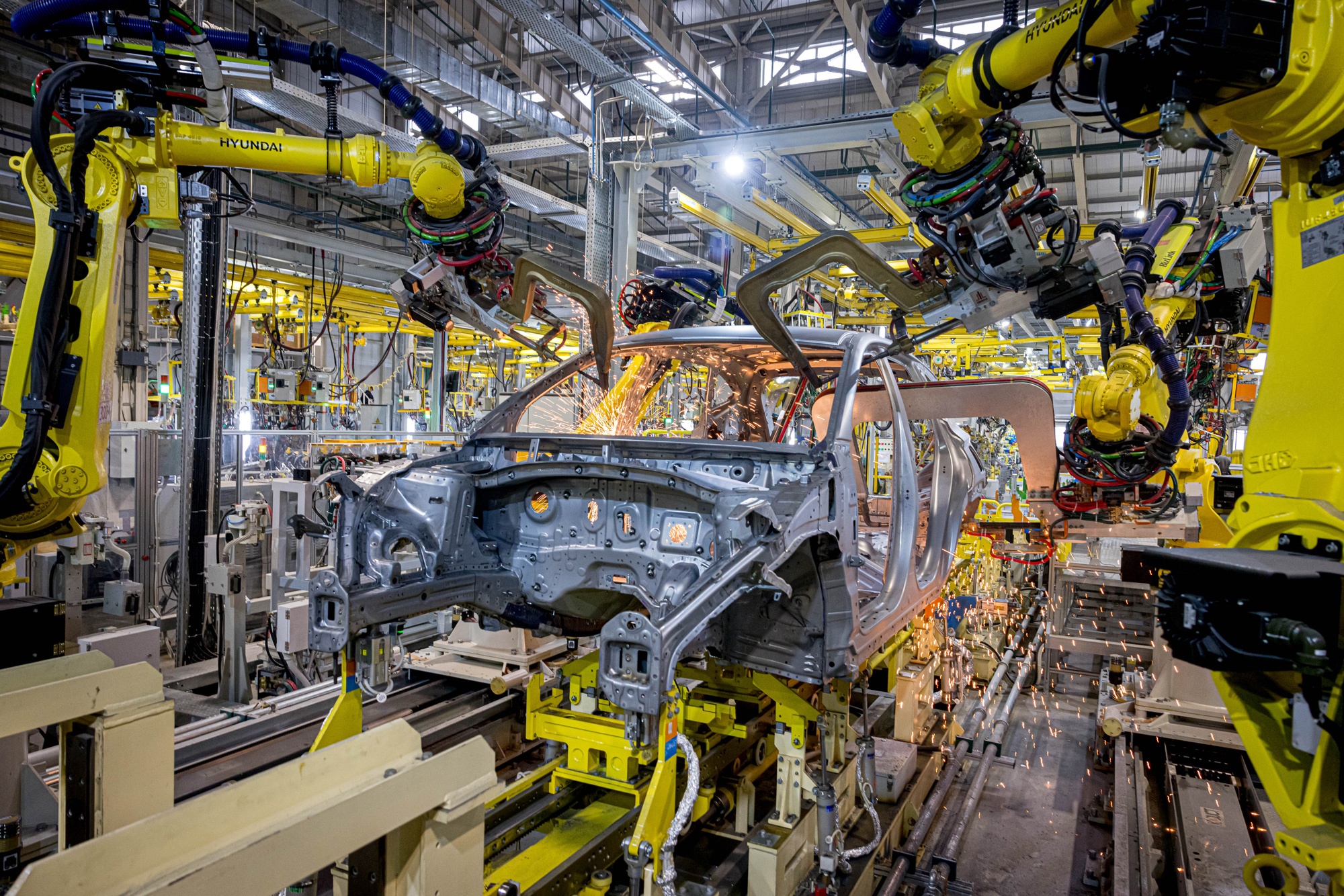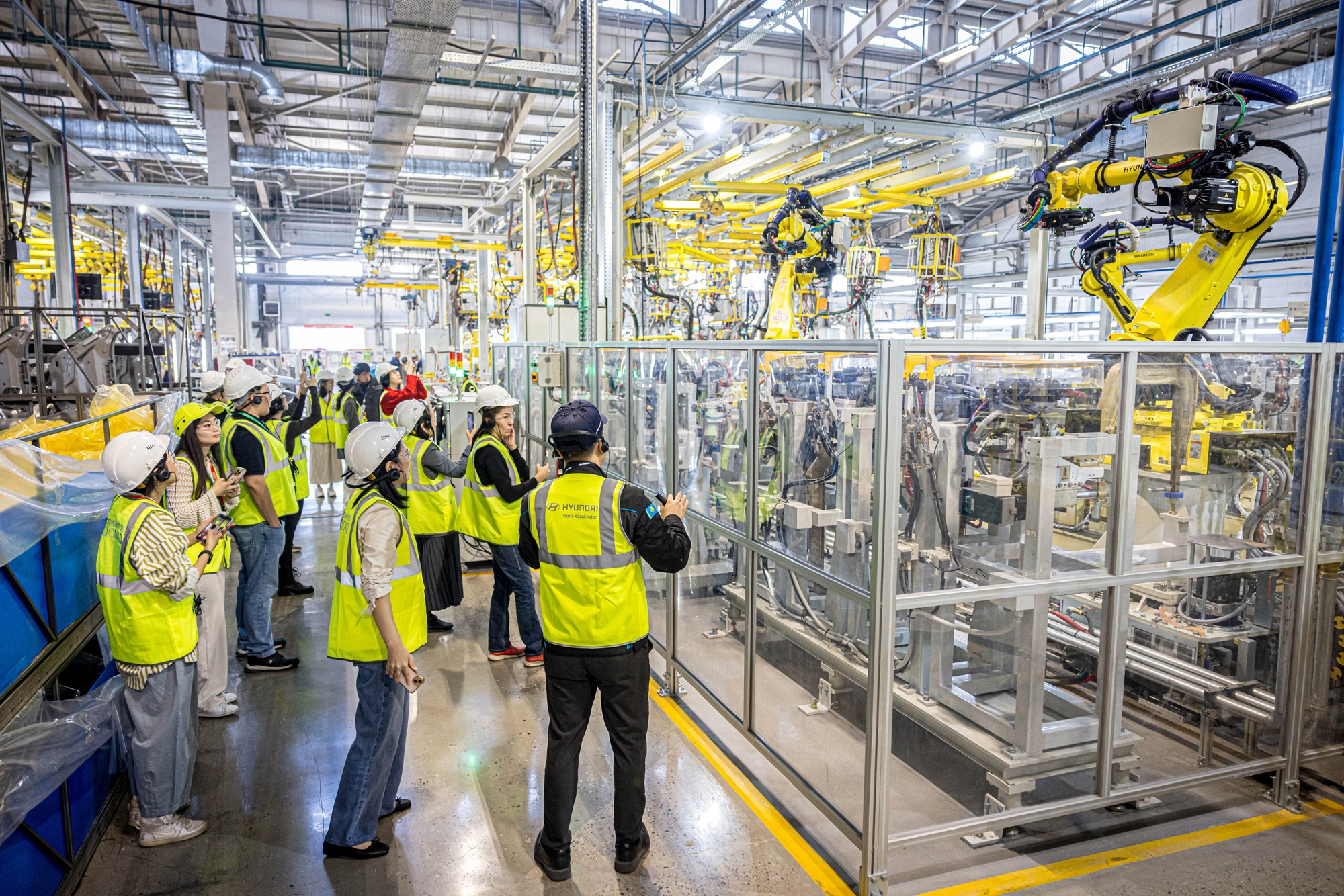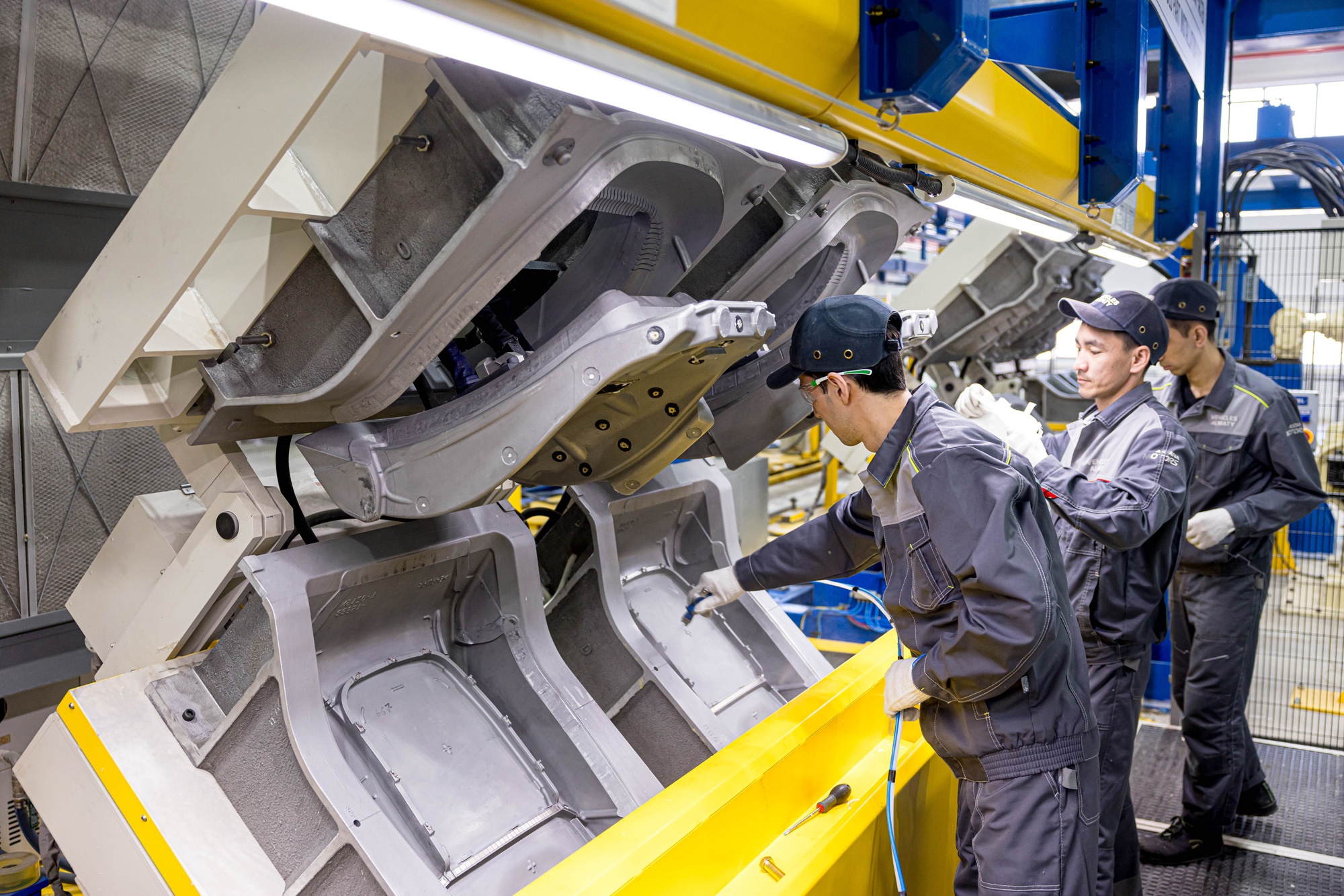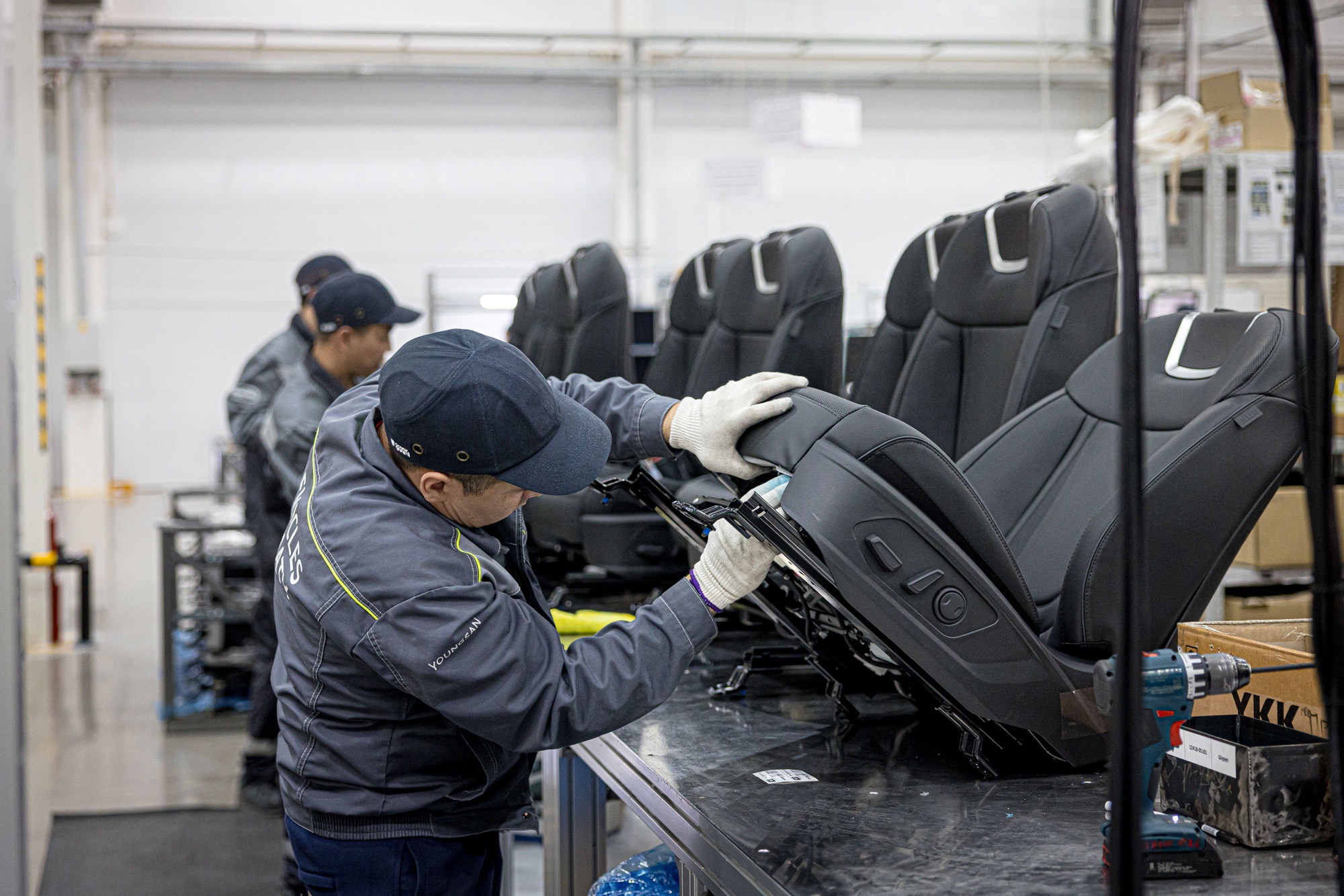Astana Motors’ Plants: Focus on Robots, Skilled Labor and Localization of the Automotive Industry
Journalists were the first to evaluate the upgrade of the Hyundai Trans Kazakhstan passenger car plant and to visit the Almaty Autoparts Production seat manufacturing plant.
Astana Motors plants hosted journalists on April 15 as part of a press tour organized in the Industrial Zone of Almaty by the Department of Business and Investment of Almaty together with the regional communications department.

Another big step brought Kazakhstan closer to the status of a car-producing country. This is not just a bold statement, but a fact supported by production figures.
Robots in the Kazakh Automotive Industry
The upgrade of Hyundai Trans Kazakhstan is something to be proud of for the domestic automotive industry. Operational since 2020, the facility boasts a production capacity of around 50,000 vehicles per year. Half of them will be produced using welding and painting, that is in the form of CKD production. In the first quarter of this year, almost 13,000 cars have already rolled off the assembly lines here.
The plant produces a wide range of models. Currently, Hyundai Trans Kazakhstan makes Tucson, Mufasa, Santa Fe, Palisade crossovers; Sonata and Elantra sedans; Staria and Custin minivans, as well as four executive Genesis models. The multimedia system with the interface in the Kazakh language adds a national touch to some models.
A new level for Hyundai Trans Kazakhstan is robotic production. From January to February of this year, the plant extensively improved production processes in order to deepen localization and increase productivity.

Hyundai Trans Kazakhstan plant. Welding shop. Photo: Astana Motors
As a result of these efforts, four Hyundai Robotics welding robots (Republic of Korea) and 14 servo guns were installed in the welding shop, 111 welding guns were upgraded. An automatic conveyor and an automatic roof roller with integrated welding were also added, along with new welding jigs for the Hyundai Santa Fe model. Robots will now handle a crucial 30% of welding tasks in most complex areas such as door openings, which have the highest concentration of hard-to-reach weld points.
Notably, despite the introduction of robotic equipment, the welding shop's headcount did not decrease. On the contrary, staffing increased from 112 to 150 employees as new job positions were added and new technologies deployed.
“Iron assistants” have also appeared in the painting shop. Here, six Yaskawa industrial robots from Japan and an automatic conveyor for feeding car bodies to the painting line were launched. In addition, the cathodic dip coating line and production areas, such as areas for applying sealant and putty, preparing the body for painting and polishing, were upgraded. In the final assembly shop, four robots from South Korean manufacturer SM AGV have been launched for the automatic transfer of trolleys carrying car bodies, further boosting the shop's efficiency.

Hyundai Trans Kazakhstan plant. Painting shop. Photo: Astana Motors
“In total, in 2025, the number of Hyundai Trans Kazakhstan employees will grow to 1,600 people, including due to the expansion of our engineering team. This is a result of the completed upgrade and the increase in CKD production volume to 50% of the plant’s output. To this end, we purchased 11 robots and other necessary equipment from our partners in the Republic of Korea, Japan and China. Invited South Korean engineers, as well as our Kazakhstani specialists participated in the installation and configuration of the equipment, who thus got the opportunity to enhance their technical skills,” said Deputy Director for Production at Hyundai Trans Kazakhstan Yerbol Kasymkanov.
For information, in the first quarter of 2025, official Hyundai dealers sold 11,705 cars, up 26.2% year on year. All these were made by Hyundai Trans Kazakhstan. This strong performance ensures the brand maintains its leading position in the automobile market of Kazakhstan and reinforces the plant’s status of a manufacturer of “people’s cars”.
Kazakhstan’s Dream – a Car Made in KZ
Car seats and multimedia systems are already produced in Kazakhstan, in the technology park for the production of auto components, which is part of Astana Motors. About 15.5 billion tenge were invested in the construction of the technology park.

Car seats manufactured at Almaty Autoparts Production are already being supplied to Hyundai Trans Kazakhstan. Astana Motors is implementing this project together with its South Korean partner Youngsan. The project is currently in its first phase, focusing on establishing processes such as production of seat foam cushions, frame and control assembly, upholstery fastening, plastic component installation, and testing of car seat control systems. The plant is equipped with machinery imported from South Korea, featuring an automated line for foam molding and a seat assembly line specifically for Hyundai vehicles. This includes assembly fixtures with pneumatic fastening and a testing system to check all electrical functions of the seats. Kazakhstani seats are already used in Hyundai Tucson, and in the near future the plant will launch the production of seats for the Hyundai Santa Fe.
The plant is set to embark on a new phase of localization in 2026. Over 720 million tenge will be invested in construction, equipment of sewing shops and training of staff to launch production of car seat covers using supplied raw materials.

“We can already say that local component manufacturing is expected to impact the final vehicle price for end consumers. The more localized components we have, the more noticeable the effect on the cost is. Plus, the reduction in logistics costs and the use of local labor contribute to the prospect of producing more affordable cars for Kazakhstanis,” said Askar Ibrashev, Director of Almaty Autoparts Production.
Almaty Autoparts Production plans to supply seats to the Astana Motors Manufacturing Kazakhstan multi-brand plant and other auto manufacturers. Currently, the company is also negotiating with Chinese partners to localize auto components for Changan, GWM (Haval and Tank), and Chery models, which are slated for production at the multi-brand plant following its planned launch this May.
